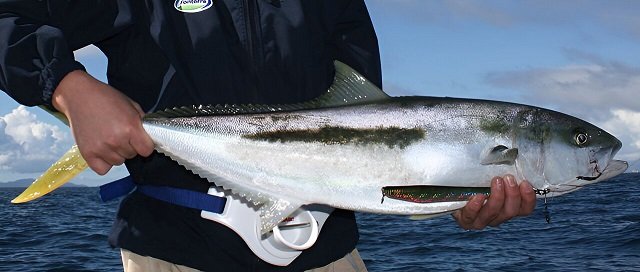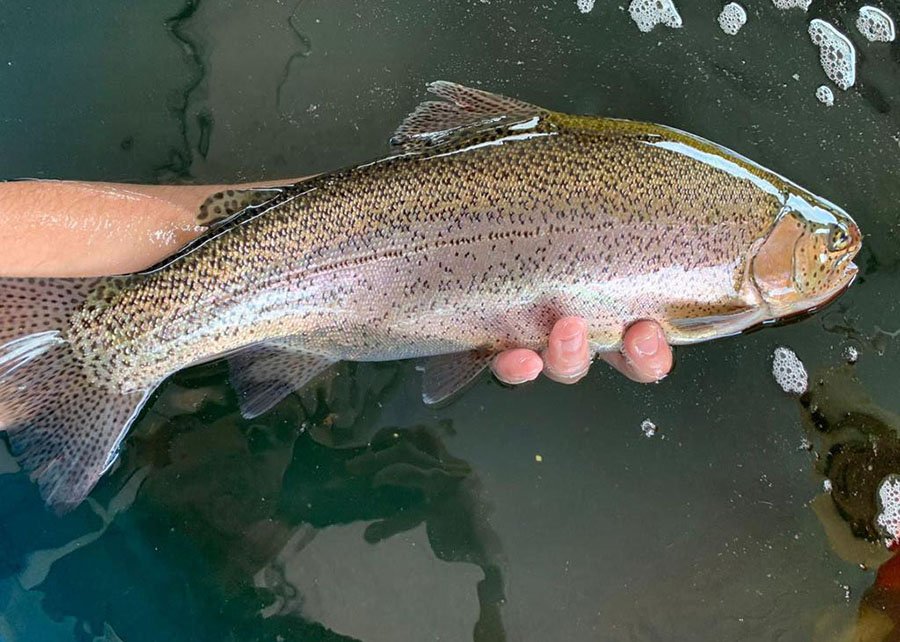
Marine fish farming is a rapidly growing industry. However, a key challenge lies in finding sustainable and cost-effective feeding options for farmed fish. Traditionally, fish oil (FO) has been an important component of aquaculture feeds, but concerns about its sustainability and cost have led researchers to explore alternative low-cholesterol options such as poultry oil (PO) and canola oil (CO).
This new study published in the journal Aquaculture by scientists from Flinders University (Australia), the South Australian Research and Development Institute, and The University of Adelaide (Australia) investigated the effects of substituting FO with PO and CO in the diets of Yellowtail Kingfish (Seriola lalandi). The findings provide valuable insights for optimizing aquaculture feeds while maintaining fish health.
“Reducing the use of sardines and other small wild-caught fish to maintain farmed fish (to produce more farmed fish for human consumption) will help maintain our oceans and the fishing food chains,” says Associate Professor James Harris from the College of Science and Engineering at Flinders University.
- 1 The Growing Demand for Sustainable Aquaculture
- 2 The Importance of Fish Oil
- 3 Challenges of Fish Oil Dependence
- 4 Exploring Alternatives to Fish Oil
- 5 The Impact of Fish Oil Alternatives on Fish Health
- 6 Key Findings:
- 7 Implications for Marine Fish Farming
- 8 Future Research
- 9 Entradas relacionadas:
The Growing Demand for Sustainable Aquaculture
Fish oil (FO) has long been a staple in aquaculture feeds, as it provides essential fatty acids vital for fish health and growth. However, the growing demand for fish oil, along with concerns about its sustainability, has led to the search for alternative lipid sources. This article delves into the challenges and potential solutions associated with reducing dependence on fish oil in aquaculture.
The Importance of Fish Oil
Fish oil is rich in long-chain polyunsaturated fatty acids (LC-PUFA), such as eicosapentaenoic acid (EPA) and docosahexaenoic acid (DHA). These fatty acids are essential for fish health, supporting growth, reproduction, and immune function. However, dependence on fish oil has significant implications for sustainability and economic viability.
Challenges of Fish Oil Dependence
- Rising Costs: The growing demand for fish oil has driven up prices, making it an expensive component of aquaculture feeds.
- Limited Supply: The availability of fish oil is limited by factors such as overfishing and competition from other industries like human nutrition.
- Environmental Concerns: Harvesting fish for oil can have negative environmental impacts, including habitat destruction and bycatch.
Exploring Alternatives to Fish Oil
To address these challenges, researchers and aquaculture producers have been exploring alternative lipid sources. These include:
- Vegetable Oils: Canola oil, soybean oil, and other vegetable oils have been explored as potential substitutes for fish oil. While they can provide essential fatty acids, their composition may differ from fish oil, potentially affecting fish health and performance.
- Marine Oils: Oils from marine sources, such as krill and squid, may offer a sustainable alternative to fish oil. However, their availability and cost may be subject to fluctuations.
- Synthetic Oils: Advances in biotechnology have enabled the production of synthetic LC-PUFA, which can be incorporated into aquaculture feeds. While this technology is promising, its commercial viability and acceptance remain to be seen.
The Impact of Fish Oil Alternatives on Fish Health
Substituting fish oil with alternative lipids can have implications for fish health. For example, some alternatives may contain higher levels of cholesterol, which can affect bile acid synthesis and liver function. It is crucial to carefully evaluate the nutritional composition of alternative lipids and their potential effects on fish health and performance.
Key Findings:
To better understand the impact of FO substitution on fish health and physiology, researchers have conducted studies on Seriola lalandi. These studies have examined the effects of replacing FO with PO or CO on liver histology, hepatic cholesterol and bile acid synthesis, enzyme activity, and bile acid recycling.
The main findings of the study were:
Stay Always Informed
Join our communities to instantly receive the most important news, reports, and analysis from the aquaculture industry.
- FO Replacement with PO: Completely replacing FO with PO in the diet (Diet 1) led to an increase in liver vacuole volume, suggesting potential alterations in fat storage within the liver.
- Balancing PO with CO: Combining PO with CO (Diets 4, 5, and 6) mitigated the negative effects observed with 100% PO (Diet 1). This suggests that a combination of these oils could be a viable alternative to FO.
- Bile Acid Synthesis: The study found a correlation between the reduction of FO and lower levels of bile acids in the liver. Bile acids are crucial for fat digestion and absorption, suggesting that the fish might be adapting to different dietary fats.
- CYP7A1 Enzyme: The level of a specific enzyme (CYP7A1) involved in bile acid synthesis increased with higher PO and lower FO. This further supports the idea that fish are adapting their bile acid production to utilize alternative fats.
- Blood Chemistry: Importantly, there were no significant changes in blood chemistry parameters across the different diets, indicating that there were no adverse effects on the overall health of the fish.
“We found that both canola plant oil and poultry oil could be effectively used, although some potentially adverse changes were observed in the livers of the kingfish,” says Associate Professor Harris.
“These changes give us the opportunity to further investigate the crucial role of kingfish fat metabolism as we continue to seek ways to manipulate formulated feeds to produce these popular fish, which are also farmed in Japan, Europe, and the Americas.”
Implications for Marine Fish Farming
This study provides promising evidence that Yellowtail Kingfish can be successfully raised on diets containing a blend of PO and CO as a complete replacement for FO. This has significant implications for the sustainability and profitability of Yellowtail Kingfish aquaculture.
Future Research
Further research is needed to explore the long-term effects of these alternative diets on fish health, growth performance, and overall gut health. Additionally, investigating the optimal ratios of PO and CO for different fish species could further refine sustainable feeding practices in aquaculture.
The study was funded by the Australian Government Department of Agriculture and Water Resources as part of its Rural R&D for Profit Programme, the Fisheries Research and Development Corporation (FRDC).
Contact
James O. Harris
College of Science and Engineering, Flinders University
GPO Box 2100, Adelaide, South Australia, 5001.
Email: James.Harris@flinders.edu.au
Reference
Crowe, B. H., Harris, J. O., McWhorter, T. J., Bansemer, M. S., & Stone, D. A. (2025). Liver structure and function in yellowtail kingfish, Seriola lalandi, in response to alternative oils in feed. Aquaculture, 594, 741379. https://doi.org/10.1016/j.aquaculture.2024.741379
Editor at the digital magazine AquaHoy. He holds a degree in Aquaculture Biology from the National University of Santa (UNS) and a Master’s degree in Science and Innovation Management from the Polytechnic University of Valencia, with postgraduate diplomas in Business Innovation and Innovation Management. He possesses extensive experience in the aquaculture and fisheries sector, having led the Fisheries Innovation Unit of the National Program for Innovation in Fisheries and Aquaculture (PNIPA). He has served as a senior consultant in technology watch, an innovation project formulator and advisor, and a lecturer at UNS. He is a member of the Peruvian College of Biologists and was recognized by the World Aquaculture Society (WAS) in 2016 for his contribution to aquaculture.







